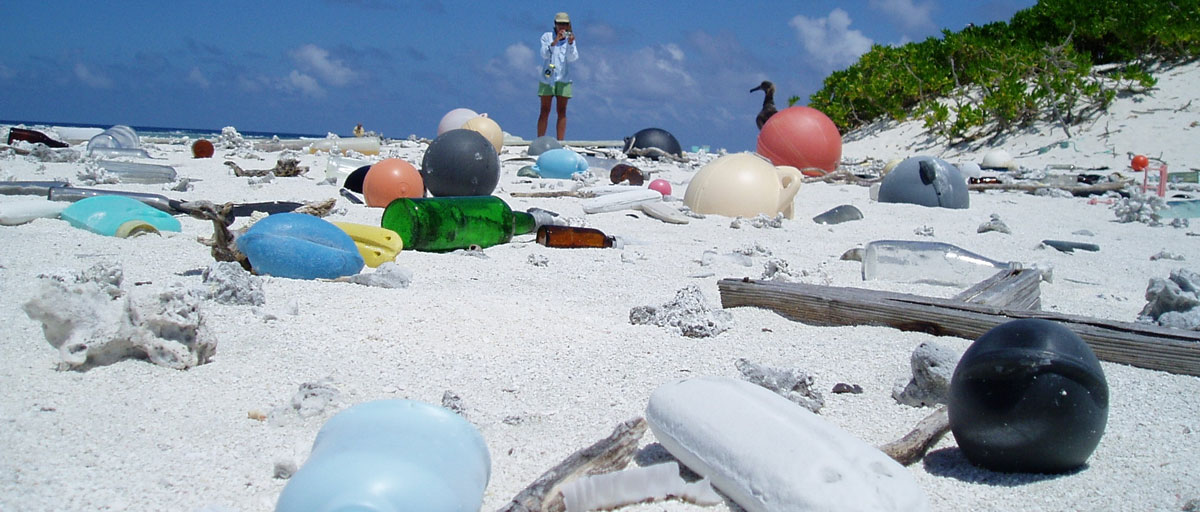PLANETARY BOUNDARIES
Safe planetary boundary for pollutants, including plastics, exceeded, say researchers

There are an estimated 350,000 different types of manufactured chemicals on the global market. The rate at which these pollutants are appearing in the environment far exceeds the capacity of governments to assess global and regional risks, let alone control any potential problems, researchers warn. Photo: P. Sommer/Unsplash
There has been a 50-fold increase in the production of chemicals since 1950. This is projected to triple again by 2050
- First assessment published of planetary boundary related to “novel entities” (synthetic chemicals including plastics)
- Researchers conclude planetary boundary has now been exceeded, raising the risks to the stability of the Earth system.
- Better risk management and monitoring and reduction in harmful production and release of pollutants needed urgently to return within the planetary boundary.
OUT OF CONTROL: For the first time, an international team of researchers has assessed the impact on the stability of the Earth system of the cocktail of synthetic chemicals and other “novel entities” flooding the environment.
The 14 scientists conclude in the scientific journal Environmental Science and Technology that humanity has exceeded a planetary boundary related to environmental pollutants including plastics.
“There has been a 50-fold increase in the production of chemicals since 1950. This is projected to triple again by 2050,” says co-author Patricia Villarubia-Gómez from the Stockholm Resilience Centre.
Plastic production alone increased 79% between 2000 and 2015, the team reports.
The pace that societies are producing and releasing new chemicals and other novel entities into the environment is not consistent with staying within a safe operating space for humanity.
Patricia Villarubia-Gómez
Fills important gap in research
There are an estimated 350,000 different types of manufactured chemicals on the global market. These include plastics, pesticides, industrial chemicals, chemicals in consumer products, antibiotics and other pharmaceuticals. These are all wholly novel entities, created by human activities with largely unknown effects on the Earth system. Significant volumes of these novel entities enter the environment each year.
“The rate at which these pollutants are appearing in the environment far exceeds the capacity of governments to assess global and regional risks, let alone control any potential problems,” says co-author Bethanie Carney Almroth from the University of Gothenburg.
The research fills an important gap in analysis of “planetary boundaries”.
In 2009, an international team of researchers identified nine planetary boundaries that demarcate the remarkably stable state Earth has remained within for 10,000 years - since the dawn of civilization. These boundaries include greenhouse gas emissions, the ozone layer, forests, freshwater and biodiversity. The researchers quantified the boundaries that influence Earth’s stability, and concluded in 2015 that four boundaries have been breached. But the boundary for novel entities was one of two boundaries that remained unquantified.
This new research takes this a step further.

Credit: Designed by Azote for Stockholm Resilience Centre, based on analysis in Persson et al 2022 and Steffen et al 2015. Click to download.
Overwhelming evidence
The researchers say there are many ways that chemicals and plastics have negative effects on planetary health, from mining, fracking and drilling to extract raw materials to production and waste management.
“Some of these pollutants can be found globally, from the Arctic to Antarctica, and can be extremely persistent. We have overwhelming evidence of negative impacts on Earth systems, including biodiversity and biogeochemical cycles,” says Carney Almroth.
Global production and consumption of novel entities is set to continue to grow. The total mass of plastics on the planet is now over twice the mass of all living mammals, and roughly 80% of all plastics ever produced remain in the environment.
Plastics contain over 10,000 other chemicals, so their environmental degradation creates new combinations of materials – and unprecedented environmental hazards. Production of plastics is set to increase and predictions indicate that the release of plastic pollution to the environment will rise too, despite huge efforts in many countries to reduce waste.
Shifting to circular economy
The researchers conclude that current increasing trends of chemical production and release put the health of the Earth system at risk. The authors call for actions to reduce the production and release of pollutants.
“We need to be working towards implementing a fixed cap on chemical production and release,” says Carney Almroth.
“And shifting to a circular economy is really important. That means changing materials and products so they can be reused not wasted, designing chemicals and products for recycling, and much better screening of chemicals for their safety and sustainability along their whole impact pathway in the Earth system”, adds Sarah Cornell from the Stockholm Resilience Centre.
Svensk sammanfattning
För första gången har forskare lyckats bedöma den "planetära gränsen" för nya kemiska substanser, som t ex mikroplaster, antibiotika och organiska miljögifter.
De 14 forskarna bakom den nya studien drar slutsatsen att den planetära gränsen nu har överskridits, med globala risker som följd.
Huvudanledningen till att de bedömer att gränsen överskridits är att den årliga produktionen och utsläppen av nya kemiska substanser vida överstiger samhällets förmåga att bedöma risker och övervaka utsläppen.
Stora och snabba förändringar behövs nu (när det gäller såväl riskhantering och miljöövervakning som kraftigt minskade utsläpp) för att återvända inom planetens hållbara gräns.
"Det har skett en 50-faldig ökning av produktionen av kemikalier sedan 1950. Den beräknas tredubblas igen till 2050", säger medförfattaren Patricia Villarubia-Gómez från Stockholm Resilience Centre. Plastproduktionen i världen ökade med 79 % mellan 2000 och 2015, enligt forskarna.
I tidigare analyser av de planetära gränserna (2009, 2015) var gränsen för kemiska föroreningar och andra ”novel entities” en av två gränser som forskarna inte lyckats beräkna.
Persson, L., Carney Almroth, Collins, C.D., Cornell, S., de Wit, C. et.al. 2022. Outside the Safe Operating Space of the Planetary Boundary for Novel Entities
Environ. Sci. Technol., https://doi.org/10.1021/acs.est.1c04158
Press contact:
Owen Gaffney, director of international media and strategy
owen.gaffney@su.se
Tel: +46734604833









